Mr. Lincoln not only had to manage the slavery issue, he had to manage a wide spectrum of opinion about the slavery issue among Union supporters. As President, he did not have a great deal of experience with the people he needed to manage. The pre-interviews in late 1860 and early 1861 that Cabinet officers had with Mr. Lincoln were often their first real exposure to the future President. In 1861, three factions were represented within the Republican Party – compromisers to delay secession like William Seward, compromisers to expose Southern hypocrisy like Massachusetts Congressman Charles Francis Adams, and hardliners against compromise like Massachusetts Senator Charles Sumner.
After the bombardment of Fort Sumter in April 1861, the situation got more complicated. Mr. Lincoln had to manage not only a Civil War on the eastern and western fronts, but he also had to manage a multifaceted civil war among supporters of the Civil War whose policy differences were magnified by personal quarrels. Historian Albert Bushnell Hart counted political groups around the President somewhat differently as the war wore on: “At least four different elements may be distinguished in the supporters of Mr. Lincoln’s administration; first, the anti-slavery Republicans, of whom Chase was the only distinct representative in the cabinet; second, the moderate Republicans, of whom a type, if not a leader, was Seward; third, the war Democrats, at first headed by Stephen A. Douglas, who offered his personal support and aid to the President, and who, with his followers, believed and expected that the war would be finished without affecting slavery in the States; fourth, the loyal border-state men, many of them slaveholders, represented in the South by Crittenden, and in the cabinet by Bates and Montgomery Blair. Such men adhered to the Union under the assurance that their property rights would be safeguarded.”1
In putting together his Cabinet, Mr. Lincoln mixed a group of men who had serious objections to each other’s inclusion. But Mr. Lincoln wanted a balanced Cabinet of competent men. “This willingness to work the best man for the job was one of Lincoln’s greatest political virtues,” wrote historian Philip Van Doren Stern. “When he was thinking of using [Salmon P.] Chase in his Cabinet, a friend in Springfield had warned him that Chase considered himself a bigger man than Lincoln. ‘Well, said Lincoln, if you know of any other men who think they are bigger than I am, let me know. I want to put them all in my Cabinet.'”2
Many Pennsylvanians objected to Simon Cameron representing their state in the cabinet. In early January 1861, Congressman Thaddeus Stevens, who himself coveted the Keystone State slot in the Cabinet, wrote fellow Congressman Elihu Washburne of Illinois: “In answer to your inquiry I will make a plain statement of facts. Some ten days ago it was rumored that Genl. Cameron had declined a seat in Mr Lincoln’s cabinet. One of my colleagues suggested my name for the place. I objected untill it was ascertained from Mr. Cameron himself if it were true as I would have no contest on my account. A short time afterwards General Cameron called on me as he said to inform me that he had absolutely declined going into the cabinet, and wished me to allow my name to be used as most likely to unite all factions I asked him, as a question of honor, whether he might not yet be induced to reconsider his determination and accept. He answered that there was no earthly contingency which would induce him to go into Mr. Lincoln’s cabinet; and again urged me to allow my name to be presented. I consented. His friends in the House who had signed his recommendation joined in mine under his advice– If it be possible (as I fear) that he has so far forgotten his honor as to consent to be again considered a candidate, you may well understand how I should view it personally. I do not say what I know of the Generals antecedents But his character may be well inferred from this act I must ever look upon him as a man destitute of honor and honesty.”3
Members of his Cabinet not only objected to each other; they objected to the way Mr. Lincoln related to them and their policy advice. Navy Secretary Gideon Welles recorded his voluminous critiques of his colleagues and the Cabinet in his diary. On February 15, 1864, Welles wrote: “The President commenced his administration by yielding apparently almost everything to Seward, and Seward was opposed to Cabinet consultations. He made it a point to have daily or more frequent interviews with the President, and to ascertain from him everything that was being done in the several Departments. A different course was suggested and pressed by others, but Chase, who should, from his position and stand, have been foremost in the matter and who was most decidedly with us then, flinched and shirked the point. He was permitted to do with his own Department pretty much as he pleased, and this reconciled him to the Seward policy in a great degree, though he was sometimes restless and desired to be better informed, particularly in regard to what was doing in the War Department. Things, however, took such a course that the Administration became departmental, and the result was the President himself was less informed than he should was the President himself was less informed than he should have been and much less than he ardently craved to be, with either the War or Treasury. The successive Generals-in-Chief he consulted constantly, as did Seward, and, the military measures being those of most absorbing interest, the President was constantly seeking and asking for information, not only at the Executive Mansion, but at their respective offices and headquarters. Scott and McClellan, and Halleck, each influenced him more than they should have done, often in a wrong direction, for he better appreciated the public mind and more fully sympathized with it than any of his generals. Neither of the three military men named entered into the great political questions of the period with any cordiality, or in fact with any correct knowledge or right appreciation of them. Yet they controlled and directed military movements, and in some respect the policy of the government, far more than the Cabinet.”4
Historian Fawn M. Brodie wrote that President “Lincoln was, in fact, the driver of an eight-horse team. In front were the Radical Republicans, galloping furiously forward, heedless of obstacles in the road. The second team were the Conservative Republicans, headed in the same direction, but less impulsive and often fearful. Behind them came the War Democrats, leaping forward in a great cooperative lunge in the beginning, and afterward doing their best to swerve the lead team from its fixed goal of ‘the Union with emancipation’ to ‘the Union as it was and the Constitution as it is.’ Eventually they did their best to unhorse the driver. Finally, there were the copperheads, who did nothing but sit on their haunches and stall. As could be expected, it was on the Negro question that they pulled off in all directions.”5
When personal and policy difficulties did not separate Mr. Lincoln’s advisors, sometimes stupid bureaucratic ones did. “In the summer of 1864, Mr. Blair, the Postmaster-General, desired to have a certain character of orders relating to the postal service within the lines of the army,” wrote postal official Absalom H. Markland. When the subject was brought to the attention of General [Ulysses S.] Grant, he suggested that the proper orders ought to be issued by the Secretary of War, Mr. Stanton. A draft of the proposed orders was made in the Adjutant-General’s office at head-quarters, and a letter to accompany them was sent to the Postmaster-General. I was directed to go to the War Department and ask that the orders be issued. Mr. Stanton, the Secretary of War, declined to issue them to accommodate Mr. Blair, the Postmaster-General. The trouble was that there was a little official jealousy between the two Cabinet Ministers. When I returned to Mr. Blair with the information that the orders would not be issued by the Secretary of War, he said, ‘We will see.’ He wrote a letter to Mr. Lincoln, which he gave to me to deliver with the accompanying papers. The letter of Mr. Blair read in this way:
“I would respectfully ask the President’s attention to the within communication. While the mail communications with the army of the West have been satisfactory, those with the army here have not been. To remedy this I brought Colonel Markland here. He had been with General Grant and had his confidence. The General, you will perceive, prepared the requisite orders, but they remain unacted on in the War Department.6
As usual, Mr. Lincoln tried to finesse the situation. Markland brought the letter to President Lincoln ad the White House and explained the differences between Blair and Stanton. Mr. Lincoln responded: “If I understand the case, General Grant wants the orders issued, and Blair wants them issued, and you want them issued, and Stanton won’t issue them. Now, don’t you see what kind of a fix I will be in if I interfere? I’ll tell you what to do: “If you and General Grant understand one another, suppose you try to get along without the orders, and if Blair or Stanton make a fuss I may be called in as a referee, and I may decide in your favor.'”7
Sometimes, Mr. Lincoln’s interventions needed to be more direct between officials competing for his attention and power. “It was generally believed by many of the friends of Mr. Seward, that the latter ran the administration,” wrote Massachusetts Congressman John B. Alley. “Nothing could be farther from the fact. I know, of my own personal knowledge, that Mr. Lincoln would not allow Mr. Seward to send any very important dispatch to England, until he had first shown it to Senator Sumner, who was chairman of the Committee on Foreign Relations. Mr. Lincoln once told me that he had the greatest confidence in the judgement of our Massachusetts Senator in everything pertaining to foreign relations. One day Mr. Seward wrote a dispatch, to be sent to England, to which Mr. Sumner strongly objected. Both gentlemen were summoned to the White House with the dispatch. Mr. Lincoln said that it must not be sent. He took his pen, erased a portion and interlined his own words. He said that he feared a war with England, should the dispatch, as first written, be sent. It was sent as corrected by the President.”8
Blame was another divisive commodity in ample supply in Mr. Lincoln’s Washington. Historian Brodie wrote that “Stevens blamed [Secretary of State William H.] Seward for Lincoln’s reluctance. ‘I have accused the prime minister to his face for having gone back from the faith he taught us,’ he said, ‘and instead of arming every man, black or white, who would fight for this Union, withholding a well-meaning President from doing so.'”9 In addition to emancipation, Stevens was also one of the foremost proponents of using black troops in battle. “When it was protested in Congress that to employ Negro soldiers would mean Negroes commanding white troops, Stevens pointed out that non-commissioned officers only.’ He went on bitterly: ‘I do not expect to live to see the day when, in this Christian land, merit shall counterbalance the crime of color. True, we propose to give them an equal chance to meet death on the battle-field. But even then their great achievements, if equal to those of Dessalines, would give them no hope of honor. The only place where they can find equality is in the grave. There all God’s children are equal.”10
One point of contention was the use of black soldiers in the war. Stevens Biographer Samuel W. McCall wrote: “Stevens still kept up his fight to the enlistment of negro soldiers. After waiting in vain for action by the military committee, he boldly presented his bill to the House, and secured an assignment for its consideration without awaiting the report of any committee.”11 Historian Richard Nelson Current wrote that President “Lincoln continued to show a lack of enthusiasm for black troops, accepting them much more slowly than Stevens demanded. Stevens blamed this on the influence of border-state politicians – in particular, the influence of the Blair family. Old man Blair, once a member of Andrew Jackson’s ‘kitchen cabinet,’ lived in Silver Spring, Maryland, just outside Washington, and still considered himself an unofficial adviser too whoever happened to be president. His son Montgomery was Lincoln’s postmaster general. His other son, Francis, Jr., was both a member of Congress and a general in the army. Regarding Montgomery Blair, Stevens wrote in the fall of 1863: ‘If such men are to be retained in Mr. Lincoln’s Cabinet, it is time we were consulting about his [Lincoln’s] successor.'”12
Generally, positions on slavery hardened during the Civil War. But among Mr. Lincoln’s supporters, not all moved to the hard position. Maryland’s Montgomery Blair came from a slaveholding family but he had taken the legal side of black slave Dred Scott in the 1857 Dred Scott decision of the Supreme Court. He was the lone Cabinet hardliner on defending Fort Sumter in March 1861. His brother Frank was a leading anti-slavery Republican in Missouri before the war. Frank Blair was also a leading advocate of black colonization outside the U.S. borders, but during the Civil War Frank became a leading opponent of emancipationists, inside and outside the Lincoln Administration.
Illinois Senator Orville H. Browning went from supporting General John C. Fremont’s emancipation proclamation in the summer of 1861 to opposing President Lincoln’s emancipation proclamation in the fall of 1862. William H. Seward was known for speaking of an ‘irrepressible conflict” in 1858, but as Secretary of State-designate in early 1861, he was a leading proposing of compromise. Seward biographer Glyndon Van Deusen wrote Seward felt that slavery was on its way to extinction and that the balance of sectional political power “had been shattered by the pro-slavery fanatics. They had plunged the country into a war which threatened the existence of the Union….”13
Van Deusen wrote: “It was clear to Seward that the purpose of the war was the preservation of the Union, but he did not think that immediate emancipation and colonization were the proper means for ending the slavery problem. He opposed colonization because the Union needed all its manpower, and would need it in the times of peace that lay ahead. Slavery, he felt, should be dealt with pragmatically, rather than on the basis of idealistic concepts of freedom. He urged [Charles F. Adams, just before hostilities broke out, to avoid debating moral principles. Three weeks later he informed [U.S. Minister to France William] Dayton that the condition of slavery in the states would remain the same, whether the southern revolt succeeded or failed, and that the rights of the states over their own institutions would remain unimpaired. His position was virtually identical with that of the Crittenden resolution on the objects of the war which passed the Senate in July 1861 by a vote of 30 to 5, with men like Fessenden, Grimes and Wade voting yea. But by 1862 it was anathema to the radicals.”14
Much more dogmatic was Ohio’s Salmon P. Chase. Chase biographer Albert Bushnell Hart wrote: “While Seward said strong things and then tempered them, while men like Henry Wilson sought to find other issues for the Republican party, while Douglas was reelected senator from Illinois on the programme of not caring whether slavery was voted down or voted up, Chase stood out unswervingly as a political abolitionist.”15 Biographer Frederick J. Blue wrote: “To Chase the war had become a means to his long sought goal of emancipation, whereas to Lincoln emancipation was the means to a successful war and restoration of the Union.”16
But ambition blurred Chase’s vision. Pennsylvania editor Alexander K. McClure wrote that Chase “never forgave Lincoln for the crime of having been preferred for President over him, and while he was a pure and conscientious man, his prejudices and disappointments were vastly stronger than himself, and there never was a day during his continuance in the Cabinet when he was able to approach justice to Lincoln. Like [Massachusetts Senator] Sumner, he entered public life ten years before the war by election to the Senate through a combination of Democrats and Free-Soilers, and it is worthy of note that these two most brilliant and tireless of the great anti-slavery leaders cast their last votes for Democratic candidates.”17 Aide John Hay wrote that Mr. Lincoln thought he knew more than his critics: “It was his intellectual arrogance and unconscious assumption of superiority that men like Chase and Sumner never could forgive.”18
Mr. Lincoln’s vision remained clear. After the Republican National Convention in Baltimore in June 1864, Thad Stevens came to the White House to say: “Mr. President…our Convention at Baltimore has nominated you again, and not only that, but we are going to elect you. But the certainty of that will depend very much on the vote we can give you in P[ennsylvani]a in October; and in order that we may be able in our State to go to work with a good will we want you to make us a promise; namely that you will reorganize your Cabinet and leave Montgomery Blair out of it.'”19
Mr. Lincoln declined to be pressured: “Mr. Stevens, I am sorry to be compelled to deny your request to make such a promise. If I were even myself inclined to make it, I have no right to do so. What right have I to promise you to remove Mr. Blair, and not make a similar promise to any other gentleman of influence to remove any other member of my Cabinet whom he does not happen to like? The Republican party, wisely or unwisely has made me their nominee for President, without asking any such pledge at my hands. Is it proper that you should demand it, representing only a portion of that great party? Has it come to this that the voters of this country are asked to elect a man to be President – to be the Executive – to administer the government, and yet this man is to have no will or direction of his own[?] Am I to be the mere puppet of power – to have my constitutional advisers selected for me beforehand, to be told I must do this or leave that undone? It would be degrading to my manhood to consent to any such bargain – I was about to say it is equally degrading to your manhood to ask it.”20
The emancipation of black slaves and the murder President Lincoln stilled many of Mr. Lincoln’s critics. Eleven years after Mr. Lincoln’s death, black abolitionist Frederick Douglass addressed a crowd gathered to dedicate the “Freedmen’s Monument” in Lincoln Park east of the U.S. Capitol: “The honest and comprehensive statesman, clearly discerning the needs of his country, and earnestly endeavoring to do his whole duty, though covered and blistered with reproaches, may safely leave his course to the silent judgment of time. Few great public men have ever been the victims of fiercer denunciation than Abraham Lincoln was during his administration. He was often wounded in the house of his friends. Reproaches came thick and fast upon him from within and from without, and from opposite quarters. He was assailed by abolitionists; he was assailed by slaveholders; he was assailed by the men who were for peace any price; he was assailed by those who were for a more vigorous prosecution of the war; he was assailed for not making the war an abolition war; and he was most bitterly assailed for making the war an abolition war.”21
Even New York Tribune editor Horace Greeley, no stranger to the internecine wars in the Republican Party, wrote Francis P. Blair, Sr., in December 1864: “There is yet much work before us, and we are in great danger of being betrayed by divisions. I look to you, as the oldest in political experience of our men at Washington, to mediate and moderate and bring about a good understanding among all our true men. I am sure you realize that we cannot afford to have such true men as Sumner, Wade and Julian alienated from the Administration, and yet there is danger of it if you do not interpose to calm the fury of faction.”22
Footnotes
- Albert Bushnell Hart, Salmon P. Chase, p. 253-254.
- Philip Van Doren Stern, The Life and Writings of Abraham Lincoln, p. 108.
- Abraham Lincoln Papers at the Library of Congress. Transcribed and Annotated by the Lincoln Studies Center, Knox College. Galesburg, Illinois. (Letter from Thaddeus Stevens to Elihu B. Washburne, January 19, 1861).
- Gideon Welles, Diary of Gideon Welles, Volume I, p. 526-527 (February 15, 1864).
- Fawn M. Brodie, Thaddeus Stevens : Scourge of the South, p. 142.
- Allen Thorndike Rice, editor, Reminiscences of Abraham Lincoln, p. 327-328 (A. H. Markland).
- Allen Thorndike Rice, editor, Reminiscences of Abraham Lincoln, p. 328-293 (A. H. Markland).
- Allen Thorndike Rice, editor, Reminiscences of Abraham Lincoln, p. 579 (John B. Alley).
- Fawn M. Brodie, Thaddeus Stevens: Scourge of the South, p. 160.
- Fawn M. Brodie, Thaddeus Stevens: Scourge of the South, p. 160.
- Samuel W. McCall, Thaddeus Stevens, p. 222.
- Richard Nelson Current, , Speaking of Abraham Lincoln: The Man and His Meaning for Our Times, p. 87-88.
- Glyndon Van Deusen, William Henry Seward, p. 329.
- Glyndon Van Deusen, William Henry Seward, p. 329.
- Albert Bushnell Hart, Salmon P. Chase, p. 176.
- Frederick J. Blue, Salmon P. Chase: A Life in Politics, p. 189.
- Alexander K. McClure, Lincoln and Men of War-Times, p. 132.
- Michael Burlingame, editor, At Lincoln’s Side: John Hay’s Civil War Correspondence and Selected Writings, p. 110 (Letter from John Hay to William H. Herndon, September 5, 1866).
- Charles M. Segal, editor, Conversations with Lincoln, p. 337.
- Charles M. Segal, editor, Conversations with Lincoln, p. 338.
- Frederick Douglass, Life and Times of Frederick Douglass, p. 486.
- Allan Nevins, War for the Union: The Organized War to Victory, 1864-1865, p. 140.




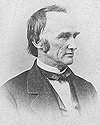 Montgomery Blair
Montgomery Blair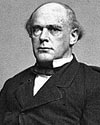 Salmon P. Chase
Salmon P. Chase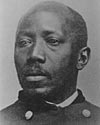 Martin Delany
Martin Delany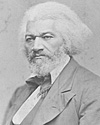 Frederick Douglass
Frederick Douglass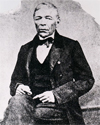 William de Fleurville
William de Fleurville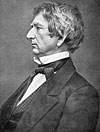 William Henry Seward
William Henry Seward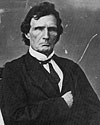 Thaddeus Stevens
Thaddeus Stevens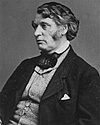 Charles Sumner
Charles Sumner